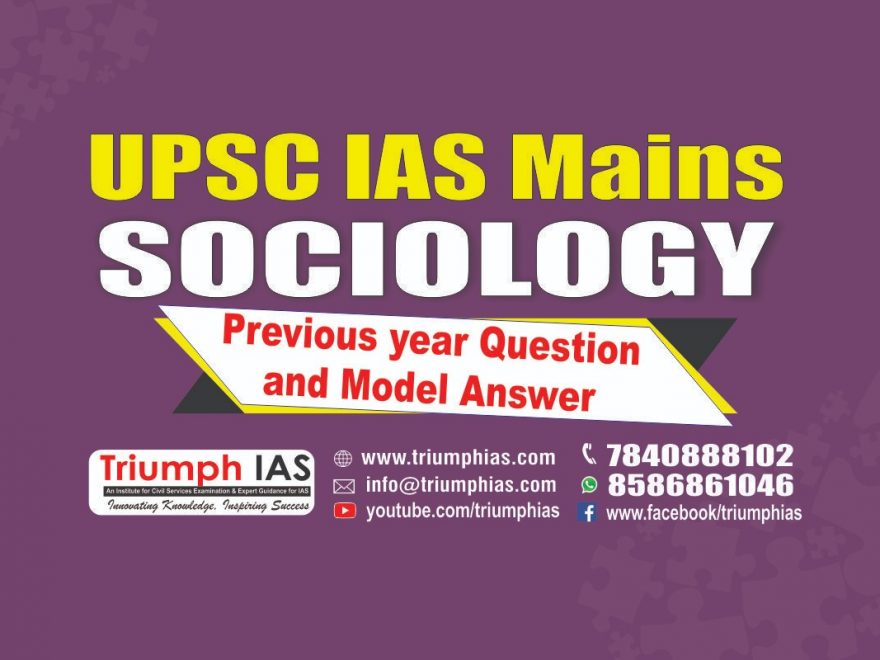Critically analyze the contemporary relevance of Durkheim’s theory of religion.
Answer
Durkheim argued that the source of religion is not any mysterious or supernatural force, but society itself. An object of worship is only a ‘symbolic representation’ of the collective sentiments and beliefs of the members of the society. The feelings of awe and reverence that it generates is the same as that generated by society, itself. Therefore, in the worship of the ‘sacred’, an individual is worshipping society and it s belief systems. Religion is therefore to be understood as a clear distinction between the ‘sacred’ and ‘profane’ and the source of the sacred is society itself. Religion has its foothold in society.
b) Since religion is the ‘divinization’ of society, therefore religious beliefs and practices reinforce ‘collective conscience’. Religion therefore becomes a source of group solidarity. Participation in religious rituals further strengthen the ‘moral bonds’ and therefore integration in society.
c) Durkheim argued that there is ‘something eternal in religion’. Though religion was not doomed to total obsolescence in modern societies, but there would be a decline in the social significance of religion. Secular morality would come to replace religious morality.
Durkheim’s explanation of religion was based on the study of homogenous aboriginal societies and therefore it is difficult to ‘generalize’ it and apply it on contemporary complex modern society. According to Hamilton, Durkheim’s views on religion are more relevant to small, non-literate societies, where there is a close integration of culture and social institutions, where work, education, family life, leisure tend to merge and where members share a common belief and value system. In modern societies, there are many sub-cultures, social and ethnic groups, specialized organizations. As a result of this multiculturalism and plurality of beliefs, it is difficult to conceive of religion as ‘divinization of society.’ This ‘divinization’ through religious beliefs and practices is a possibility in small scale, simple societies but in modern complex societies, where there exists plurality of groups, beliefs, life-styles, such a conception of religion has it’s limitations.
According to Robert K. Merton, Durkheim showed that in a non-literate civilization, religion might have integrative functions, but in multi-ethnic, multi-religious society religion could have certain ‘disintegrative’ aspects too. Such a dysfunctional aspect of religion, especially to be seen in contemporary times cannot by accounted by Durkheim’s theory of religion. If a single religion dominates a society, it may be an important source of ‘social stability’. If a society’s members adhere to numerous competing religions however, religions differences may lead to destabilizing social conflicts. Examples, of religious conflict within a society include struggles between Sikhs, Hindus, Muslims in India; Catholics and Protestants in Northern Ireland; Shia and Sunni Muslims in Iraq; clashes between Muslims and Christians in Bosnia; and ‘hate crimes’ against Jews, Muslims and other religious minorities in the United States. Therefore, in contemporary times, religion can threaten social integration as much as it can contribute to it.
Durkheim’s understanding of religion as ‘worship of the society’, emphasizes only on the positive functions of religion. Karl Marx, argues that religion undoubtedly has a strong ideological element and these religious beliefs and values often provide justifications of ‘inequalities’ of wealth and power. This is especially to be seen in many of the traditional religions of the world.
The contemporary society however, provides some empirical support to Durkheim’s conception of religion in modern societies, as evidenced in the emergence of New religious movements. These encompass an enormous diversity of groups, ranging from spiritual, self help groups, sects and cults. Many of these groups can be explained as a response to increasing modernization and rationalization of societies. As a result of increasing ‘reflexivity’ and questioning of traditional rituals, the emergence of these religious groups have ensured the ‘vitality’ of religion in modern societies.
However, religious fundamentalism as a “discernible pattern of religious militance by self–styled true believers” seen mostly as a response to ‘processes of modernization’, is a phenomena which cannot be explained by Durkheim’s conception of religion. Being anti–modernist in it’s orientation, religious revivalism of the ‘fundamentalist type’, is a source of great threat to contemporary social order. Fundamentalism is edged with the possibility of violence and examples of violence inspired by religious allegiance are not uncommon. Ex. Fundamentalist movements among Jews in Israel, Muslims in Pakistan, Palestine, Egypt, Sikhs and Hindus in India. Terrorism spawned by fundamentalist groups, as evidenced in the 9/11 attacks in the U.S.A.’, and suicide bombings. Religious fundamentalism, has the potential to divide a ‘religious community’ as well as create schisms in the wider society and this is in complete discontinuity with the role of religion as envisaged by Durkheim. As Hamilton argues that it is often out of religious convictions that individuals will fly in the face of society or attempt to withdraw from it.
Therefore, Durkheim’s ‘theory of religion’ derived out of a study of an aboriginal tribe, has it’s limitations as well as it’s own relevance in understanding religion in contemporary times.

